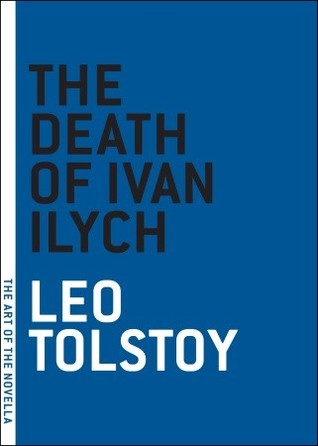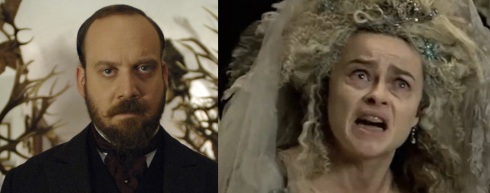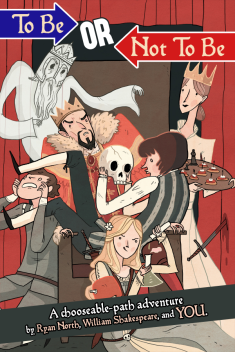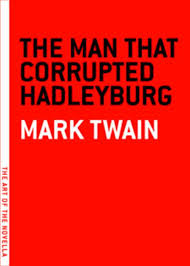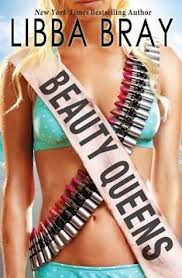Humor is one of the ways we humans cope with difficult times. It’s a defense mechanism and a method of critique. It can be used to show respect for something or to ridicule something, to build up or undermine. It’s a powerful tool that a lot of people underestimate, especially when it’s used in literature. A lot of readers dismiss humorous novels because they mistake lack of seriousness for lack of talent, and there’s definitely a line to cross, as we’ve seen in the whole slew of novels in a rising genre of its own that remakes classics by including comic elements like zombies and vampires. (I think it all started with Seth Grahame-Smith’s 2009 Pride and Prejudice and Zombies.) I wanted to create a list of novels that used humor, parody, satire but also included worthwhile content. Here are seven books that meet those criteria with one bonus book that doesn’t really meet those criteria but I felt obligated for whatever reason to include.

I encourage you to check out or buy a copy of Hugh Laurie’s The Gun Seller!
1. The Gun Seller by Hugh Laurie (yes, the Hugh Laurie–of “A Bit of Fry and Laurie” and “Jeeves and Wooster” and “House” and that bit part in Ang Lee’s Sense and Sensibility that really makes it worth watching, and don’t forget the live action 1996 reboot of 101 Dalmatians) is the perfect example of comedy as homage. Its hero, retired army officer Thomas Lang, is swept up into a massive spy conspiracy involving a conglomeration of every agency and criminal organization ever, and he’s forced to come to terms with his own apathy while saving the world from terrorists. The novel is everything I’d expect from the television king of sardonic humor: it’s crass, it’s dry, it’s very British, and it mindfully (as much as a book can take agency and be mindful, right?) mocks the trope of roguish-quasi-hero-saves-the-world-and-gets-the-girl. This is where two different expressions of humor are really apparent. Laurie uses his comedic skills to parody popular thriller novels, but ultimately he gives the thriller genre praise by doing so. Laurie respects the genre which is why and how he can write such a wonderful novel. As a reader, I approached The Gun Seller and enjoyed it immensely for those same reasons: I respect the thriller genre, and that allows me to be able to laugh at it. I expect and appreciate the double-crossing femme fatale. I look forward to the moment where all hope seems lost and then EXPLOSIONS!!! and the good guy wins. When I laugh at Laurie’s mockery, I lose no respect for the genre. (A few other books I’ve read pull this off well, too: Lev Grossman’s The Magicians contains elements that parody Harry Potter and The Chronicles of Narnia; and Ryan North’s To Be or Not To Be that I reviewed earlier this week parodies Hamlet.
2. To Be or Not To Be by Ryan North is–hands down–the funniest book I’ve read this year. Maybe it’s just because I read a lot of depressing books, but nothing has ever really made me guffaw so much as this wildly popular Kickstarter baby. To Be or Not To Be is a parody of Shakespeare’s Hamlet and is another great example of an author using humor to increase the reputation of an already powerful cultural icon. North’s book project is a chooseable-path book that allows readers to role play as Hamlet, Ophelia, or Hamlet’s father (King Hamlet Senior, who is a ghost for most of the book). “That sounds amazing!” you think to yourself. Yes, yes it is amazing. Kickstarter thought it was amazing. Readers thought it was amazing. Publishers thought it was amazing. And apparently Ryan North thought it was amazing enough to write yet another chooseable-path Shakespeare adaptation with the recently announced Romeo and/or Juliet title!
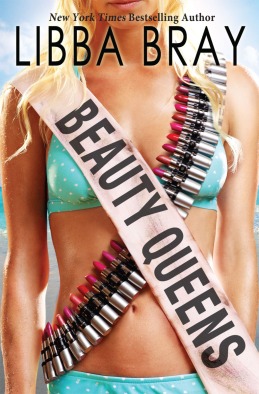
Libba Bray is one of the best Young Adult authors of our time, and Beauty Queens is the perfect combination of humor and content. (What do you call that? Wit?)
3. Beauty Queens by Libba Bray is Miss Congeniality meets Mean Girls meets Lord of the Flies. An airplane full of teenage beauty pageant contestants crash lands on a tropical island, and some expected oh-no-I-broke-a-nail-while-building-a-water-catching-trap comedy ensues. Bray introduces a pleasant variety of girls–some stereotypically ditsy, some overly ambitious, some resentful–but it’s her attempt to tackle the much more complicated issues of nascent womanhood that makes this novel worth reading. The young adult genre has traditionally been wholesome, didactic fare safe enough for even the most conservative PTAs of our country, but it’s evolving thanks to authors like Bray. In Beauty Queens, characters deal with sexuality, gender identity, abusive childhoods, single-parent households, and love (obviously), not to mention guns, conspiracies, reality TV drama, and evil dictators. This isn’t to say the book is all adolescent feelings and controversial teen sex–this is a book that will have you chortling uncontrollably. Chortling.

Get ready for some good laughs with Ed Park’s Personal Days, especially if you make your living in a cubicle like me!
4. Personal Days was Ed Park’s novel debut in 2008, and it kind of flew under the radar. Park is one of the founding editors of “The Believer,” so he knows a thing or two about humor. Personal Days takes a humorous approach in discussing the horrifying, gruesome, bloody terrors of … mundane office life. Park may have been riding the popularity of workplace comedies like “The Office,” but this novel claims its own corner in the satire world as it follows the absurd lives of the employees of an unnamed New York City company. You have your usual office antics, quirky employees, workplace rivalries, but Park takes does an incredible job of integrating text message and email formats into his story line, making it even easier to slip into the wacky world he’s created. Thinking back on this book, I’m remembering how much I enjoyed it, and kicking myself for giving away my copy. I saw Ed Park give a reading at the old Elliott Bay Bookstore, and it turns out he’s hilarious in person, too, and now somewhere out in the world, some fortunate soul owns my copy of Personal Days that includes a nice little personalized note to Jillian from Mr. Park.
5. The Man That Corrupted Hadleyburg by Mark Twain was published in my favorite series ever: Melville House’s Art of the Novella, but that wasn’t the only reason why I bought and read this book. Mark Twain is the king of satire. Yeah, yeah, we all read The Adventures of Huckleberry Finn for middle school English. (And yeah, a lot of us saw and were ruined by the 1995 Disney adaptation Tom and Huck, starring boy-heartthrob JTT.) But try revisiting Twain’s novels as an adult. Go back to Huck Finn and Tom Sawyer now that you’re sufficiently jaded with society, or have worked in customer service and are fostering your misanthropy, or read books because real people are too unworthy of interacting with you. The Man That Corrupted Hadleyburg is the story of the eponymous village who is known throughout the land as being morally infallible. When one of the townspeople insults a passing stranger, though, a hilarious story of revenge ensues. The stranger decides to hit Hadleyburg where it hurts: right in the moral infallibility. Twain’s novella is the perfect example of “we laugh so we don’t cry,” because in the end, Twain is right a lot of the time. People are assholes. And it’s funny.
6. A Confederacy of Dunces by John Kennedy Toole is the modern Don Quixote. It’s the story of 30-year-old Ignatius J. Reilly, an intelligent, egotistical, lazy, and paranoid man who lives with his mother in Uptown New Orleans. Ignatius’s main goal is to win the attention of Myrna Minkoff, but along the way engages in several dead-end jobs, meets a host of iconic side characters, and wanders through a richly painted New Orleans. I feel like I know at least five people exactly like Ignatius, and they’re always a good time. Like Don Quixote, A Confederacy of Dunces is filled with humor at the expense of its protagonist. The reader has the advantage of an outside perspective and can witness the absurdity of Ignatius’s life and motives, but Toole also injects an undertone of deep sadness that reflects his own struggles with depression. (If you don’t want to feel sad for the rest of your life, don’t read about Toole’s struggle to get this book–which won a posthumous Pulitzer Prize–published.) Before this synopsis becomes too much of a downer, I’ll leave you with a quote from ACoD:
“I am at the moment writing a lengthy indictment against our century. When my brain begins to reel from my literary labors, I make an occasional cheese dip.”
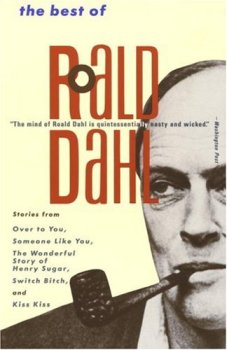
Get ready for some really dark, sick humor. The Best of Roald Dahl doesn’t have any happy children, flying peaches, or big friendly anything.
7. The Best of Roald Dahl by (guess who?!) Roald Dahl is a darker sort of humor. In fact, when I read this I kind of just chuckled nervously at the surprisingly grotesque and horrific imagination of one of the most beloved children’s book authors. Dahl is most famous for his fantastical, magical, strange children’s books like Charlie and the Chocolate Factory, Matilda, The Fantastic Mr. Fox, or The BFG. Many of his books have been adapted into film, where his darker side is seen (literally, I guess) a little more clearly. I didn’t realize Dahl not only wrote adult stories, but also wrote adult stories, moonlighting with erotic fiction and writing dozens of creepy stories that I wouldn’t show to children if my life depended on it. Beware! This is no walk through a chocolate factory, and these stories don’t end by living happily ever after with Miss Honey. Stories like “Skin” or “Mrs. Bixby and the Colonel’s Coat” show Dahl’s much darker, much drier humor, though his captivating skill as a storyteller remains.
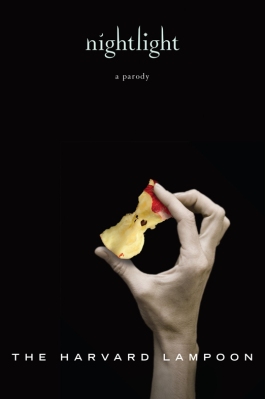
Are you a fan of schadenfreude? Do you want to see Stephanie Meyer’s Twilight crash and burn in the form of parody? Get yourself a copy of Nightlight.
8. Nightlight: A Parody by The Harvard Lampoon isn’t my typical reading fare. I picked it up from the library wanting to read more parody, and thought that a book with the name “Harvard” anywhere on the title had to be some good quality. More so, a book disparaging the empire Stephanie Meyer has built on soap opera romances with lusty vampires seemed up my alley. After reading the book, though, I waffled on the idea of including it on this list. While the humor elicited a few chuckles and silent shoulder-shaking from me, I don’t think I fully appreciated Nightlight‘s brilliance. Probably because I haven’t read any of the Twilight books. I’m not going to write this off just because I couldn’t care less about Meyer’s novels, or because there are more typos than I could count on my fingers, or because I would’ve found this funnier if it had been a lengthy caption in “The Onion.” If you like Twilight (but can take or joke) or you really hate Twilight and need to encourage your literary sadism, then Nightlight is the book for you.
Obviously, I need more humor in my life, because who doesn’t? What humorous novels do you like to read? Do you prefer disparaging satire or more of a roast in the form of a novel? Let me know!
Tags: A Confederacy of Dunces, Beauty Queens, Ed Park, Hugh Laurie, Humor, John Kennedy Toole, Libba Bray, Mark Twain, Personal Days, Roald Dahl, Ryan North, The Best of Roald Dahl, The Gun Seller, The Man Who Corrupted Hadleyburg, To Be or Not To Be
